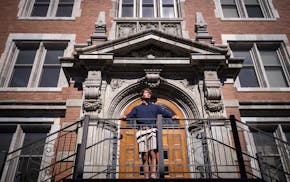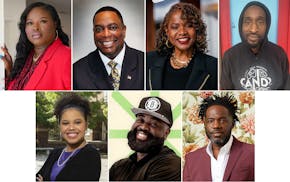Opinion editor's note: Strib Voices publishes a mix of guest commentaries online and in print each day. To contribute, click here.
•••
We asked current and former members of law enforcement in Minnesota to reflect on the five-year anniversary of George Floyd's murder. We asked them how, if at all, it changed their view of being in law enforcement, how they approach their job, how others in the community react to them and the training and guidelines for their profession.
Building and rebuilding trust
I grew up just blocks from 38th and Chicago. I have cherished memories from my childhood attending Wilder Elementary School, spending time at the Phelps and Powderhorn parks and playing at the local Boys & Girls Club. All those good memories are forever tarnished by the murder of George Floyd at that intersection.
As a kid, law enforcement was frequently called in to my chaotic and abusive household. I had a front-row seat to what a lack of community policing does to communities and what bad policing does to families. It breeds mistrust and fear.
I joined law enforcement to be a part of the change that my family and I could have benefitted from. I strive to be the person and leader my family needed to see.
When I started as a detention deputy at the Hennepin County Sheriff's Office in the early 2000s, I saw how good officers could build trust without compromising public safety. Communication, proactive interactions and getting to know the person behind the badge were the key.
By 2020, I oversaw the Hennepin County jail and courts for the sheriff's office. During the unrest, I chose to frequently walk downtown around the jail and government center to talk with the public — even those who did not want me there.
I heard from people who often looked like me, some calling me a traitor or saying I was on the wrong side of the law. I listened to elected officials claim that communities of color didn't want police at all. Those moments stuck with me. I understood the anger, but I strongly disagreed with their statements. That was not a moment to withdraw; it was a time to connect.
In 2020 more than ever, it was clear that we needed to not only rebuild trust but to build it in places where it has never existed. We needed to reorient our work to protect all communities, not just those who feel comfortable calling us. I know this is possible because I've experienced it.
As sheriff, I know we're not where we need to be yet. But we are making progress, and we will continue to make progress as long as we build genuine connections with those we serve.
Dawanna Witt, Hennepin County Sheriff
•••
The good and the ugly
What good came in the aftermath of George Floyd's death and the trials of the officers involved? Other than Derek Chauvin being found guilty and accountable for his actions, the most important change was a substantial shift in police culture. Since the beginning of modern policing, newer officers looked up to veteran officers with a military-type of authority. As a rookie, one was told to watch veteran officers, especially at big calls, and follow their direction, actions and orders. If they tell you to do something, you do it!
This was considered the best method of learning how to police: Basically, watch those with more experience. This mentoring of less experienced officers will continue to be the best manner of training; however, the difference in the post-Floyd era of policing is that rookie officers have been given the authority to both refuse to carry out an order they know to be wrong or inappropriate and to alert police staff to inappropriate actions taken by a veteran officer.
One of the worst effects was the public opinion of the police changing from, most police are good public servants patrolling to serve and protect, to, too many police are brutal racists. This was unfair to 99.9% of police who treat the public equally with respect. Secondly, charging the assisting officers who, as rookies, had no idea what was happening, and incarcerating them was an unjust mistake. Their verdicts had nothing to do with justice but were rather a sort of public appeasement. These officers were doing what they were told, and they were told to follow the direction of veteran officers.
While the city continues to joust over George Floyd Square and what the legacy of the incident and area will be, lionizing Floyd as a hero is just as inappropriate as forgetting or minimizing his tragic death. Changes since his death have hopefully brought about a better police culture in Minneapolis and across the nation.
Richard Greelis, retired Bloomington police officer
•••
Public perceptions started changing even earlier
George Floyd's death was a milestone in public perception of policing, especially in the Twin Cities. However, as a police officer, the police-involved shootings in Ferguson (2014) and of Philando Castile (2016) were bigger turning points for me. After Ferguson, it wasn't uncommon for pedestrians to stop and stare at my police car with their hands up as I drove by, echoing the "Hands up, don't shoot" motto of the time. People would also sometimes be noncompliant during routine calls and basic investigations, as if it was their civic duty to not cooperate with the police.
The night Castile was shot, I was on duty in St. Paul as a patrol supervisor. I found myself outside the governor's mansion in my police car surrounded by an angry crowd banging on my windows. Obsessively hitting the door lock button over and over, I considered the irony of possibly having to use deadly force at a protest over the police's use of deadly force. Extracting myself from the situation required surprising delicacy, but in the end I was able to drive away without incident. Several years later, I used that experience in a Bush Fellowship application to illustrate the need to improve trust between communities and the police.
In another twist of irony that was not lost on me, my selection as a Bush Fellow was publicly announced in May 2020 as I stood in front of the Midway Target in riot gear the day after Floyd died. I used my fellowship to obtain a master's degree in order to further my goal of improving the relationship between communities and their police officers.
After a 20-year career in policing, I retired in 2023 and switched to career in senior care. But I always felt fortunate to be a St. Paul police officer and to be part of a department that prides itself on maintaining positive relationships with the community and that has a strong culture of customer service.
Years before Floyd, St. Paul department leaders recognized the need for change and implemented new training and tactics that keep officers and citizens alike safer during physical encounters. Minneapolis, though tragically late, is also improving their culture through better training and hiring new officers. Five years on, I am optimistic about improved policing and increased community trust.
Matthew Koncar, former St. Paul police officer
•••
Crisis intervention training works
Five years since George Floyd died while being arrested by Minneapolis police, we in the Olmsted County Sheriff's Office in southeast Minnesota have felt the aftermath in many ways. While watching the riots from afar, the protests reached us here with marches and demonstrations demanding change. There were local threats of damage and attacks against law enforcement.
One of the demands to change was to accept the "8 Can't Wait." These were eight demands from community members that implied our office was not meeting a standard to prevent racial inequities and needed to do more in de-escalation and crisis management. When looking over the list, I responded at the time saying we met every standard they were demanding.
Since 2007, the Olmsted County Sheriff's Office and Rochester Police Department have been conducting a program for deputies and officers called Crisis Intervention Training, more commonly known by the acronym of CIT. This program educates participants about several mental health challenges, trains them how to manage those challenges in the moment as a first responder and requires them to demonstrate their understanding of the techniques with professional actors trained in presenting very complex behaviors. Deputies who have engaged with a person in crisis after the training have credited it for helping them successfully address the incident in providing care to the individual.
The other memory of the aftermath was the division and fear among families of law enforcement. The assumption by some was that all police were trained or react in the same manner as was demonstrated in Minneapolis.
We are still building back our pipeline of new recruits and are seeing success in more quality candidates as we hire great new staff. We've also seen continuous improvements in crisis management, including the expansion of county social services support with co-responder models for both mental health and addiction.
Kevin Torgerson, Olmsted County Sheriff
•••
We must do better
George Floyd should be alive. His death was not an isolated incident, but a broader pattern of racialized police violence. I am sorry for all the harm we have done to our communities, specifically to Black, brown and Indigenous people. I am sorry for all the harm we continue to do by failing to confront our own racial bias. I am sorry for the times I placed value on order instead of justice.
There are no words that can make up for actions. I see examples of amazing and compassionate police work every day and know the type of work we are capable of. It is my hope that the legacy of Floyd and of policing in Minnesota is reflected in a system of policing where everyone is heard and valued and where the police are truly of service to everyone.
Kelly McCarthy, Mendota Heights Police Chief
Opinion: People in law enforcement weigh in on how George Floyd's death impacted their profession
Burcum: 'Big Beautiful Bill' takes hatchet to health care

Readers Write: Mass shootings on campus, federal spending, Israel and Gaza, Memorial Day
Counterpoint: We must retain hope and conversation

